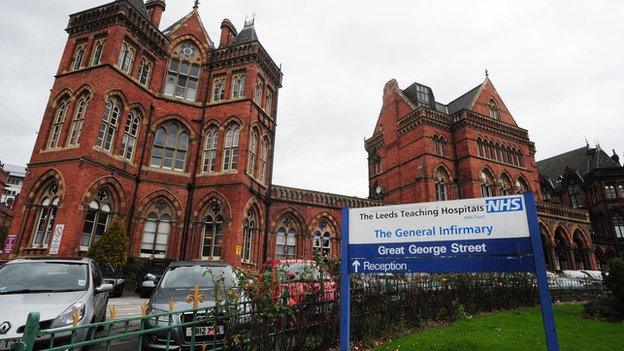Why the NHS must heed the lessons of Savile
- Published

Since the allegations about Jimmy Savile came to light, the police have looked into how many victims there may have been. An inquiry into why he was never prosecuted has also been carried out.
But the reviews into his conduct in NHS hospitals which have now been published are the most comprehensive account of how he was able to offend - and get away with it for so long.
Reviews into his behaviour at the BBC and care homes are expected later this year - and will no doubt shed even more light on the scandal.
But for now the failings of the health service - an institution that after all is there to care for the vulnerable - are in the spotlight.
Savile had unsupervised access, particularly at two sites, Leeds General Infirmary and Broadmoor psychiatric hospital, and was able to use his fame to intimidate junior staff.
What is more, senior management were too unquestioning, the reports have found.
Covering a total of 28 hospitals, they are loathe to blame individuals. But with cases of abuse and improper conduct being reported up until 2009 - albeit much less frequently than in the 1960s and 1970s - the NHS has a lot of soul-searching to do.
Age-old problem

Savile had extensive access to Leeds General Infirmary
Plenty of people in the health service have been quick to say the large-scale abuse that he perpetrated when he was most prolific would be unlikely to happen in today's NHS.
Health Secretary Jeremy Hunt made that clear in his statement to the House of Commons, while the chief executives at Leeds, Julian Hartley, and Broadmoor, Steve Shrubb, have also made the same point.
And, certainly, the safeguards in place - criminal records checks, CCTV and key-controlled access to some wards - are much more rigorous than they were.
But whether that is enough to prevent the age-old problem that is at the heart of the Savile crimes - the abuse of power - is questionable.
This is a point accepted by Dr Sue Proctor, the lead investigator in the Leeds inquiry, who said even with all the extra measures in place the "proof of the pudding is in the eating".
'Just Jimmy'
If you look at the handful of cases that took place in the 21st century, there are worrying signs.
A member of staff who made claims about an incident at Leeds in 2003 reported that her line manager, a consultant, told her not to be "silly" when she complained.
That mirrors the attitude that litters the reports into his behaviour in the NHS across nearly five decades.
When complaints were made about Savile, victims were either told that they simply would not be believed or they received responses like "oh, that's just Jimmy".
But this goes beyond Savile. As the abuse and neglect at places such as Stafford Hospital, Winterbourne View and, most recently, Essex's Old Deanery care home show, the safeguards in the health and care system can still fail.
The key, as campaigners are constantly pointing out, is to make sure the voices of victims are heard, listened to and acted on.
That is as true today as it was on the wards of Broadmoor and Leeds General Infirmary 40 to 50 years ago.